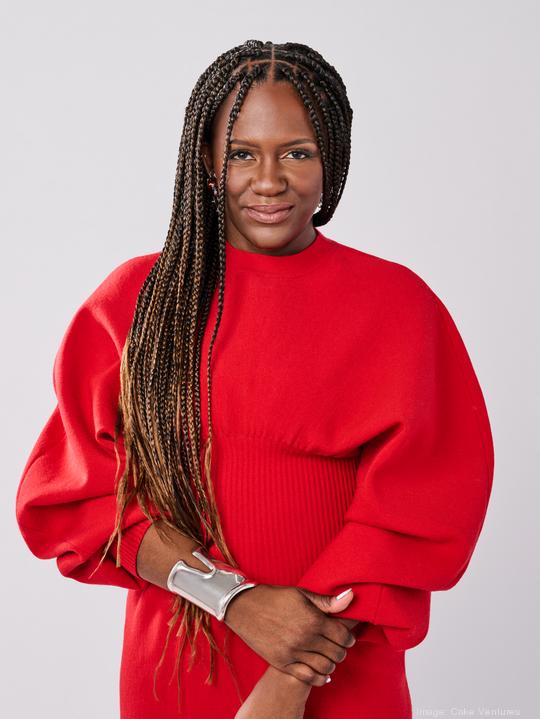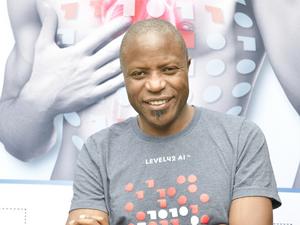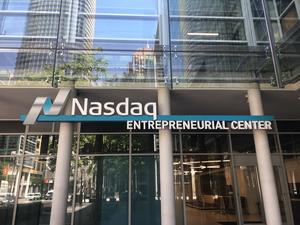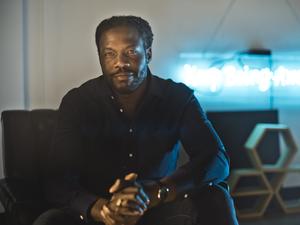
Monique Woodard is betting her career on three big demographic shifts she sees coming.
The U.S. population is aging, women have increasing amounts of purchasing power and people of color will become the majority, she told me. Those are the three pillars, or "layers," of her investing philosophy as a solo venture capitalist at Cake Ventures, her San Francisco-based firm. She also describes herself as "head baker" on her Twitter profile.
Woodard started thinking about launching her own firm in 2018 and by late 2022 closed her first fund with $17 million from investors including Melinda French Gates' Pivotal Ventures, Cendana Ventures, Screendoor, Plexo Capital, Foundry Group and Bank of America. She has made 12 investments so far and plans to reach 25 by the end of 2024.
Before pursuing a career in venture capital, Monique Woodard was on the other side of the table as an entrepreneur and tech worker. She also co-founded Black Founders, an organization that supports Black entrepreneurs, and worked for the city of San Francisco as an "innovation fellow" under then-Mayor Ed Lee's administration where she worked on projects like expanding access to broadband internet.
I spoke with Woodard recently about why she decided to make the jump from founder to investor, where she sees the biggest opportunities for innovation, and the challenges faced by first-time fund managers.
Why did you decide to transition from being a founder to a venture capitalist? I think venture capital gives you this really interesting lens on where innovation is happening and allows you to actually be a part of that and to be the fuel on the fire of other entrepreneurs' amazing vision. I also knew that capital was not being allocated efficiently or equitably. So when I moved on to the venture capital side of the table, there were very few, maybe a handful of black women in venture. Now, there are a lot more but there were very few of us at that time. And I think you only get to change who has access to capital if you change who sits on the investor side of the table. That was really important to me. We've seen the industry evolve but there are still massive disparities in access to capital.
What were some of the biggest challenges you faced while raising this first fund? First funds come with a lot of challenges. You are pitching limited partners. Many of them can't write small checks into funds. They need to write a big check into a fund, especially institutional investors. There's certainly doubt around solo GPs and the solo venture capitalist movement. Even if you already have an existing track record from somewhere else. I was very lucky that I have a really deep network. But the first one is always going to be hard for anyone.
First time fund managers often outperform larger firms. Why do you there's still a disconnect with limited partners It's a really difficult ship to turn, right? You are trying to change these entrenched ideas about first time funds and solo capitalists. All of these things, they don't change very easily. I think a lot of institutional investors that are endowments or the like are wanting to invest in emerging managers and are trying to get to know fund managers early, but it's still going to take some time.
What are the three “cake layers” that underpin your investing philosophy at Cake Ventures? We want to be investing in companies and products that are fueled by tomorrow's internet users. And so for the purposes of Cake Ventures, there are three layers of demographic change that I focus on. The first layer is aging and longevity. By 2034, there'll be more people over 65 than under 18. That represents a massive demographic shift and a massive opportunity. The second layer of the cake is companies that will get to billion dollar-plus outcomes based on the economic activity of women. And the third layer of the cake is the rise of a new majority, where people of color become the majority United States, and are already globally. And the ways that Black, Asian and Latino consumers are now are often driving internet culture and driving technology adoption.
There’s a lot of dry powder out there, but a lot of VCs seem to be more cautious right now. Does that hold true for Cake Ventures? I think we were often deploying a little bit too fast, and now we're seeing a return to a normalization of the pacing of venture capital. So I don't necessarily see it as more conservative or less risky. Venture capital is risk capital. And you are meant to be investing companies that will be huge companies, and in some cases, be massive moonshots. So I don't believe in necessarily pulling back and being conservative, but I do believe in being able to invest at a pace that you're able to actively support existing portfolio actively, and for due diligence on new companies. This kind of slowdown has allowed us to return to a normalization of the pace that venture capitalists should really be moving.
What would be your biggest advice to founders right now? I think it's easy to look at the news and see a lot of doom and gloom around the industry and around the challenges that come with fundraising in this current environment. But if we take a look back at the great financial crisis, some of the companies that came out of that are the biggest companies today. Uber, Airbnb Lyft. Out of really challenging times comes really strong, resilient companies. And really strong and resilient founders. It's really hard to feel that when you are in the cycle of trying to fundraise, but it's really important that you hold on to that and understand that this allows you to build really resilient companies. And the things that are happening now are an innovator's dream. This is a great time to be an innovator and a great time to deploy capital, and a great time to be investing in the best founders.
What advice would you give to other investors as they’re thinking about who to invest in? It's really important that we keep our eye on the ball around diversity and really investing in a wide swath of entrepreneurs of many different types and genders. In an economic downturn, this is where you see founders who are incredibly resilient, who are building in a really capital efficient way. That's a huge opportunity to invest in women and minority-led companies. We've seen women founders and Black founders and Latino founders really be resilient over time. And there's a lot of return on investment there.
When a founder is pitching you, what does it take to get you to a “yes”? I'm really looking for founders who are building big generational companies in markets that are large, and can really execute. I love it when founders can teach me something about the problem they're trying to solve. Like, they're able to effectively illuminate an area that only they know about and they have this secret cheat code or this secret sauce that only they know. And they can use that to accelerate their businesses. I get really excited when that happens and when a founder has suddenly spotted something that they've discovered about the problem or about the consumer or the category they're trying to go after.
What are your biggest red flags in a founder? I do think founders have to be willing to help investors dream with them and carry them along on the path with them. Because as a founder, you know your business the best. But as an investor, I'm going to be poking and asking questions and prodding. The founders who are going to be successful are OK with that and can weather that in a conversation. Sometimes founders are not good at that, and that can be a little bit of a red flag that they don't want to let people in.
Are there any specific types of products and services that you think will be trending over the next couple of years?Technology that helps people age in place, as opposed to having to move into a retirement home or nursing home facility, is going to continue to be a big part of the longevity layer of the cake. I've also invested in a company that uses AI and machine learning for immersive training, especially for service level jobs. And this future of nonoffice work and nonwhite collar work is really important. Artificial intelligence can really help accelerate training and skills development. We've often talked about AI in the context of taking jobs away, but how can AI help actually accelerate learning, accelerate skill development, create a much more resilient worker and workforce? And access to preventative health care is a really important one, especially around maternal health, and fintech. I think those are really important things to start looking at and investing in at scale.








